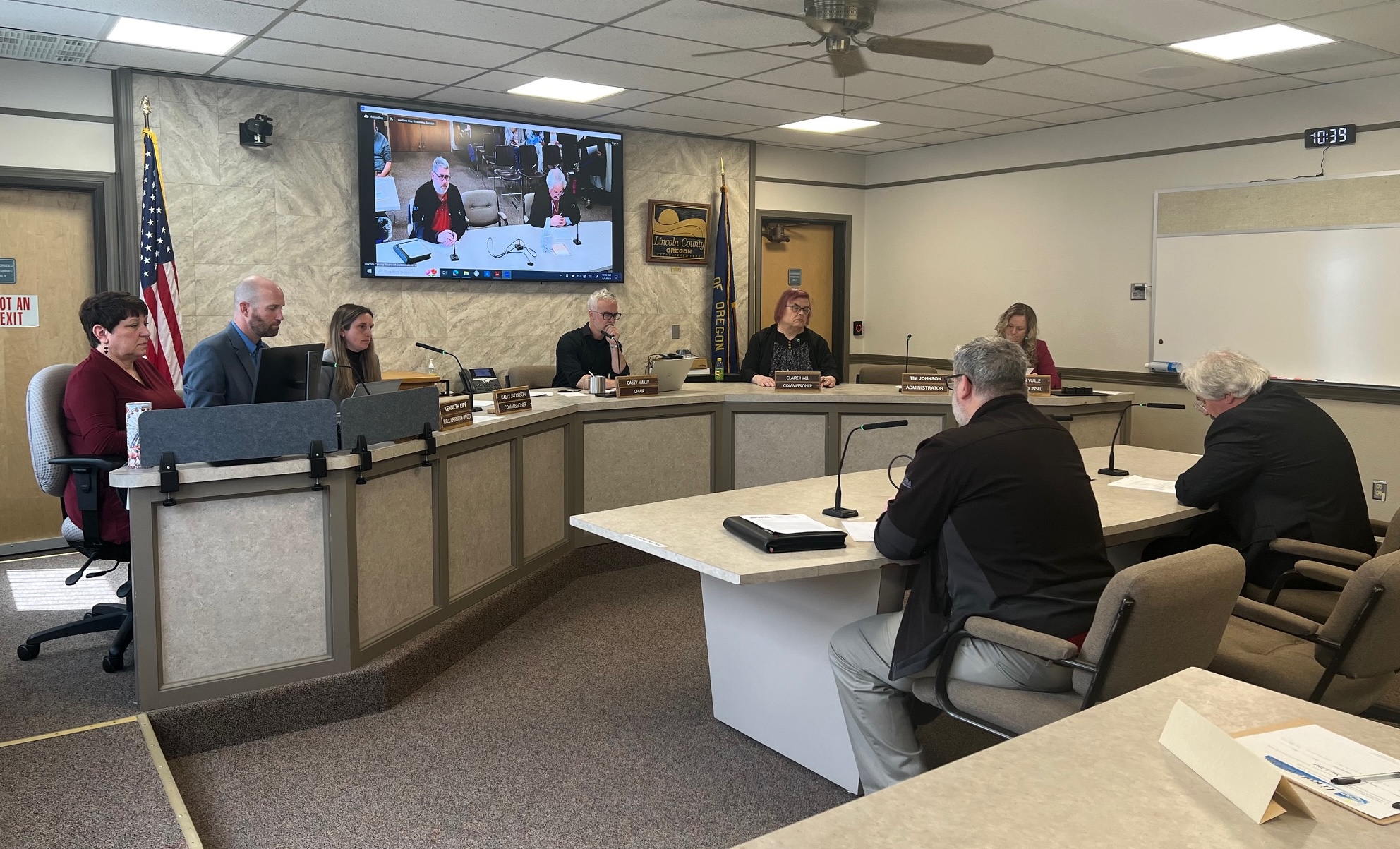
By QUINTON SMITH/YachatsNews
Lincoln County voters have a wide array of choices – five to be exact — in the May primary to decide who occupies one of three seats on the board of commissioners — or if two candidates go to a runoff in November.
Claire Hall is seeking her sixth, four-year term as a county commissioner and is being challenged by city council members from Newport and Depoe Bay and two political newcomers.
 The question is whether Hall, who enjoys widespread name recognition based on her 20 years in the office, can get more than 50 percent of the vote when there are four other candidates seeking votes. If she does, then she avoids a one-on-one contest in the November general election.
The question is whether Hall, who enjoys widespread name recognition based on her 20 years in the office, can get more than 50 percent of the vote when there are four other candidates seeking votes. If she does, then she avoids a one-on-one contest in the November general election.
“Frankly,” said one of Hall’s opponents, Depoe Bay city councilor Rick Beasley “it’s her race to lose.”
The last commission candidate to pull that off was incumbent Kaety Jacobson, who won outright over three challengers in the May 2022 primary.
In May 2020, Hall had four primary election challengers and did not get to 50 percent. But she won the general election contest against Joe Hitselberger of Seal Rock by a 55 percent to 45 percent margin.
The three-member board of commissioners oversees a county with a general budget of $50 million and nearly 500 employees. Five others – the sheriff, district attorney, clerk, surveyor, assessor and treasurer – are elected to run specific departments but rely on commissioners for their budgets.
Depending on the number of years in the job, commissioners’ salaries – not including benefits – range from $91,000 to $105,000 a year.
The primary election campaign has been a low-key affair with a few lawn signs, one joint appearance at a Lincoln County League of Women Voters forum, some media advertising, two candidate websites and posts to various Facebook pages or other social media.
Gomez, Beasley and Halbrook are all self-funding their campaigns. Parker has individual contributions totaling $1,160 and Hall has $2,450 in contributions to date, according to contribution and expenditure reports filed with the Oregon Elections Division.
Candidate background

Claire Hall, 64, came to Newport in 1987 to be a reporter at the Newport News-Times, where she worked for three years, spent a year at a Toledo radio station, then was news director for Yaquina Bay Broadcasting for 13 years. She was approached about running for commissioner in 2004, won the office in what was then a partisan general election, and has been re-elected to four four-year terms since. “I’ve always been interested in government and the political process,” she said. But the past four years have been the most difficult for the county and her professionally, she said, with a two-year Covid pandemic, the Echo Mountain fire in Otis and homeless issues. “The county is still finding a path to recovery,” she said.
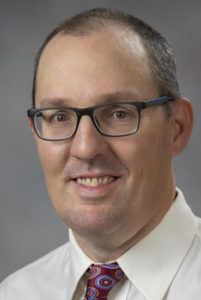
Ryan Parker, 47, of Newport, has lived in Oregon most of his life and is a 1999 graduate of the University of Oregon. He taught English in Korea and Japan and ran an adventure tour business with his wife in California and has worked as a park and beach ranger for the Oregon Parks & Recreation Department since 2008, now focusing on wetlands and conservation outreach on the central coast. He was elected to the Newport city council in 2018 and re-elected in 2022. He finished third in a four-way race for Jacobson’s commission seat in 2022. “…public service is a large chunk of my life,” he said. “Setting a good example is important and getting involved can lead to better outcomes.”

Rick Beasley, 72, of Depoe Bay was 17 and living in Scio when he joined the Army in 1969. He served three years, went to Vietnam, joined the National Guard upon his return and attended the University of Oregon before embarking on a long, colorful and sometimes controversial journalism career. Beasley and his wife came to Lincoln County in 1994 where he worked for the Lincoln City newspaper, published the tabloid-like bi-monthly Depoe Bay Beacon from 1997-2012 and then worked as a reporter for the News-Times. He was elected to the Depoe Bay city council in 2022. He and his wife own the Boiler Bay RV Park and she once owned a short-term rental management business. That experience, he says, fuels his criticism of how the county has handled regulation of vacation rentals and the economy. He told a recent campaign event that his experience as a journalist and candidate “has been as a disrupter.”

Don Gomez, 41, of Newport, grew up in Oregon and was living in California when he enlisted in the Marines in 2006. He was deployed to Iraq for 13 months in 2008-09 where he as a financial manager overseeing contracts to rebuild the country. He left the Marines in 2010, attended Cal State-Fullerton, worked for a website firm and started a content marketing business in 2016. He and his wife, Michelle, moved to Newport in 2021 where they opened a book publishing business, Sterncastle Publishing. While this is Gomez’ first foray into Lincoln County politics, it is not the couple’s first time seeking public office. Gomez served as his wife’s campaign manager in her 2018 unsuccessful campaign for San Diego County Board of Supervisors, which generated controversy over allegations of unpaid bills. Gomez said his primary strengths are his background in financial management and wanting to help “protect local jurisdictions from making California-type mistakes.”
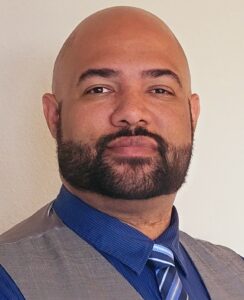
Ty Halbrook, 37, grew up in the Gresham area, joined the Marines in 2006, deployed to Iraq in 2007-08 and then spent two years in the Navy Reserves. He worked 11 years in security for Legacy Health in Portland before joining the Oregon Department of Human Services office in Newport where he worked in child protective services for five years. He now works for Lincoln County’s crisis management team, responding to mental health, drug and other emergencies. “I love helping families, helping kids in crisis. I want to serve the area on a different level … a bigger scale.” He and his wife live on 83 acres in the Bayview area north of Alsea Bay.

Questions and answers
Question 1: The shortage of affordable housing – whether workforce, subsidized or middle housing – is a major issue not only in Lincoln County but across Oregon. What role should Lincoln County government play in helping find solutions? And, briefly suggest 2-3 possible solutions.
Claire Hall: This question implies that I look into the future role and solutions for the shortage of affordable housing. Yet, as a current commissioner, I will state what I have done, am doing, and will continue to do in this matter. I negotiated funding from the Oregon Legislature that specifically goes toward financing new, affordable housing. As the current chair of the Oregon Housing Stability Council, I have steered funds to Lincoln County and other counties throughout the state for permanent and transitional housing. As a result, hundreds of homes have been developed in all corners of the county, and hundreds more are either under development or soon will be. Another responsibility I have, as OHSC chair, is reviewing and voting on “Local Innovation and Fast Track” applications from developers. The program is intended to create affordable homeownership opportunities for low to moderate income families. I’ve helped the Lincoln County make progress. I will continue to be a key player in the continued progress. I will continue to review county owned properties for buildability, partner with Habitat for Humanity to help first-time buyers, identify obstacles in development code that we may be able to eliminate, and consider land banking. In addition, I will continue to use my commissioner expertise and statewide connections to lead local and state officials and bring all parties to the table as we continue to solve the problem of housing shortage.
Ryan Parker: This problem is not just an Oregon problem but a nationwide problem. Outside the existing efforts to win state and federal grant, the structure of the tax base is the issue — shouldn’t all businesses, corporations subject to Oregon law and residents contribute to the tax rolls? Yes, but the status quo continues to burden working families, low-income residents and fixed income retirees. It’s compression that overlooks reform county commissioners should have been lobbying to fix. A harmful, outdated tax assessment system is one that we must modernize. Working people and small business owners can reinvest that savings into their communities. A working county-owned forest would be another strategy. Lincoln County does not have a state forest to fund county government like Tillamook, Coos and Clatsop counties do. We can buy land, replant it based on the best science and use it as a living laboratory, and sell the mature timber for funding operations. This is a transformative and multi-generational commitment we must make, and one that benefits our kids, the school district, and watershed protections are easier to enforce if the county owns the land. It’s a massive opportunity I will prioritize.
Rick Beasley: When it comes to Lincoln County, I am against more rural sprawl. The unincorporated areas lack the infrastructure to support new housing at levels sought by the governor. Only cities have the ability to absorb hundreds of new units. But with ample undeveloped lots for infill and new state laws that permit apartments and other multi-family developments in heretofore single-family neighborhoods, coastal cities will have the room and authority to expand housing as they see fit.
Don Gomez: County government should be leading the charge in confronting our housing crisis. We need to be building additional housing across all price ranges to do our part to meet the statewide goal of 440,000 additional housing units over the next 20 years. At the moment, the county owns a number of plots of land that are either zoned residential, or whose zoning designations allow conditional uses that would create additional housing options. Many of these are currently undeveloped. Our county should conduct a comprehensive survey of all these available tracts and work with the cities to identify opportunities within their own inventories. By co-locating or coordinating these projects, we can help keep costs low. We should be harnessing the collective efforts of county government, municipal authorities, affordable housing developers, and non-profit organizations, such as Lincoln County Habitat for Humanity to make meaningful progress towards alleviating the housing crisis in Lincoln County.
Ty Halbrook: I agree that there is a shortage of housing for all. Possible solutions include exploring state and federal grants that are currently not being utilized to help offset the cost of adding homes. Writing a grant is hard but not impossible and I believe we have the talent to get it done. We could use the grants to incentivize adding new neighborhoods. I would also like to explore the idea of people being allowed to add a secondary living unit to their home like convert a garage or allow a family to have a RV (or similar) as a place where someone could legally stay. People are already living in garages that they are renting across the county, but they don’t have any legal protection and are forced by this to live in unsafe conditions. We need to make this a legally viable option for long term tenants – but not for short-term rentals. Why can’t someone add a RV close to their home so they can help an aging or disabled family member, when their home doesn’t have enough room in it? This option would help bring families together and add protection to tenants. I understand that there is a long list of things to be addressed like septic systems would need to be emptied more frequently to keep up with increased usage, but these could be conditions linked to the rental license or the permit.
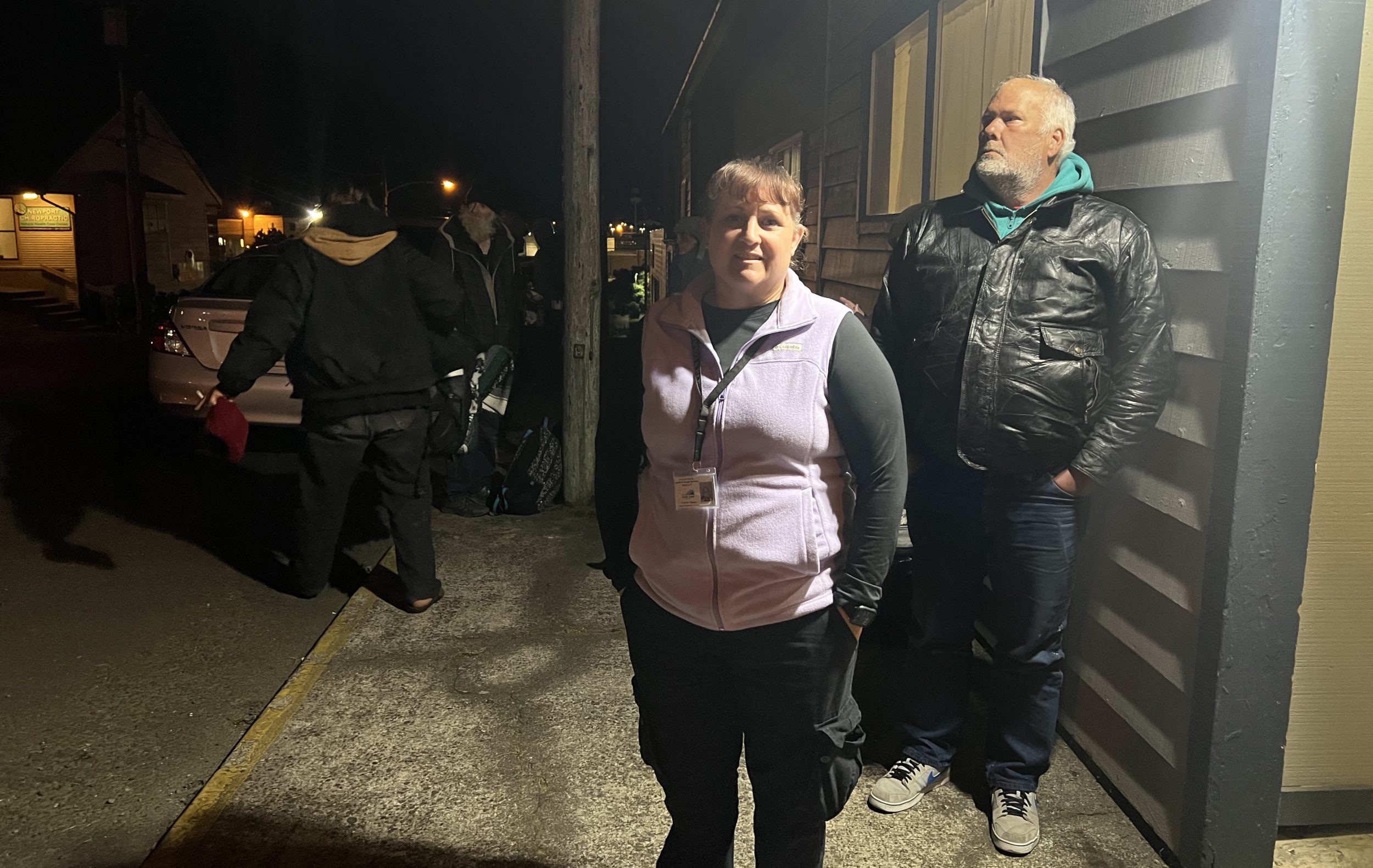
Question 2: Lincoln County is pouring a lot of effort and county, state and federal funds into helping the homeless, including hiring staff to run winter shelters, navigate services and purchase and/or remodel buildings. Do you support this approach? If so, why? If not, why?
Parker: Compassion and empathy are important, but so is the expectation that people that have found their way here to Lincoln County respect those of us who are working hard to make everyone’s lives better. In my job, I see daily the environmental impact done by those living outside societal structures. I clean up human waste and drug needles in our parks. Trash is left everywhere. This is unacceptable and really affects quality of life. It’s both structural and attitudinal, a secondary aspect that is often glossed over. Our county’s drug court has shown its effectiveness and is scalable. Let’s provide more resources to re-deploy folks in the county who have become addicted to meth, heroin and most dangerously, fentanyl, and give them a second chance. Let them live a better life and demonstrate they have positive contributions to make. Terms like affordable housing mean that it’s a lifeline to folks who work hard and want to improve their circumstances. It also means it’s supported by state, federal and local taxes, mostly paid by working residents of Lincoln County. I’d view the social safety net as not limitless, because economically it isn’t. For those that do want a way into permanent housing, the existing system can be tweaked to help them navigate that. I philosophically lean towards assisting children, foster children and vulnerable elderly residents because that is the proper, moral thing to do. Also, let’s continue the good work on the Lincoln County Housing Advisory Board, and focus on networking and requests for proposals from developers who are able to come to Lincoln County, can earnestly partner with us and build workforce housing of all types in all our towns.
Beasley: The county’s homeless plan envisions a vast new and permanent bureaucracy to solve a problem made overly complex — and thus unsolvable — by its authors. They see homelessness as a social issue to be tackled by tax increases, state housing, wage advocacy and the elimination of vacation homes. It overlooks the reality faced daily by Lincoln County residents — that homelessness is primarily a public safety issue with enormous costs to the environment. The plan ignores the role of law enforcement, the front line of contact with the chronically homeless and a gateway to treatment. Using existing laws and recent Supreme Court edicts, Lincoln County could end homelessness with the tools we have, now. Why wait to fix the problem?
Gomez: A housing-first approach with wraparound services including addiction counseling and mental health treatment are proven, effective ways to end homelessness. Successful examples from other municipalities are well documented. I commend every effort that our cities, county, and nonprofits are making in that regard. However, here in Lincoln County our homelessness issue is a bit different than other parts of the state. Sure, we have people who are on the streets because of drug addiction or mental health concerns. But we also have many more who are working multiple jobs and living out of their vehicles because they can’t afford skyrocketing rents. Most of these folks serve in key industries that keep our local economy afloat. They shouldn’t have to live like that. We also have a large elderly homeless population who are victims of circumstance as the rising costs of housing, goods, and services outstrips their ability to make ends meet. For people such as our elderly and working poor, we need low-cost options for permanent housing. Recently established transitional housing facilities are a great start, but these are not places that county residents can stay long term. The low rents paid for these facilities are nowhere near the actual cost of rent in our county. This disparity means that most of them have no real option on the other side of that “transitional” housing. The problem persists because of our outright lack of housing stock. This is an issue we could readily solve with leaders in place who are dedicated to truly addressing the problem and not continuing to apply expensive band-aids or half-baked initiatives.
Halbrook: One of the shelter positions is responsible for looking for grants during the summer months, which helps reduce the overall cost of the position and shelter. This is definitely a worthwhile position. There needs to be a planned approach and not just try to buy our way out of having a homeless problem. As someone who has personally worked with the homeless population for over 20 years I have seen some things that work and others that fail, costing taxpayers money. We need to make sure to prioritize local residents first before helping people who travel here just for our services. Hard times can happen to any of us but we need to help our neighbors before helping those who are bussed in to take advantage of the local services. Also, if a building is going to be bought or repurposed there should be a public notice so that the neighbors are aware of the plans for their community. I am aware of how upset the residents in Lincoln City are about the county’s recent shelter purchase and plans without notice. I would be upset too if I were them. That is why I’m in favor of being transparent with these types of plans.
Hall: Not only do I support this approach, I helped create it. We have saved lives and will continue to do so. The Community Shelter and Resource Center in Newport has become part of the most robust services for the unhoused that we have ever had in this county. We are moving forward on developing another in Lincoln City. The shelter has also served an important but unanticipated function by educating the public about the nature of the population served — the majority of homeless people in Lincoln County are locals, and more than 40 percent are 50 years or older. I am an ex-officio member of the Northwest Coastal Housing board and partnered with other board members to negotiate funding from the Oregon Legislature enabling our county to create transitional housing such as Nate’s Place in Newport and Coastal Phoenix Rising in Lincoln City. I am proud of the county’s approach. When we help the unhoused, it ultimately has a positive impact on the entire community. Helping homeless people and families move into safe, affordable, and/or transitional housing, attain health care, and be routinely nourished enables them to make progress in their own lives and become contributing, productive members of the community while lowering the financial burden and crime rate within the community. Please visit my campaign website to learn more about my approach.
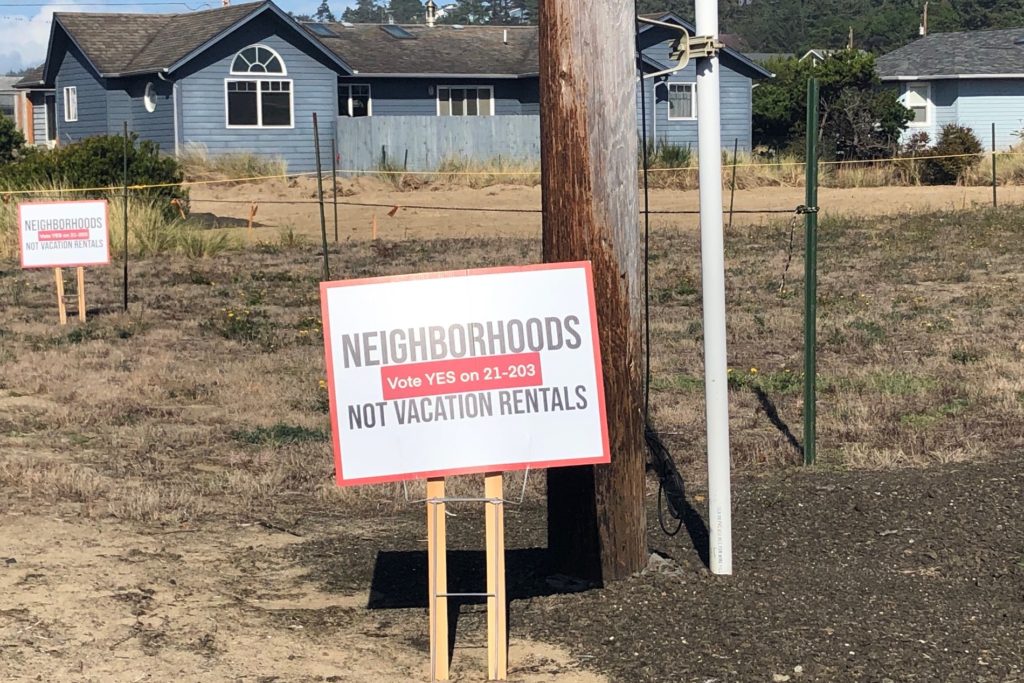
Question 3: Lincoln County government has been wrestling with how to deal with the number and type of short-term rentals in unincorporated areas since 2016, and now has an ordinance that would sharply curtail them as property changes hands over the next 20 years. Do you agree with its approach? What would you have done differently, if anything?
Beasley: We are sitting on one of the cleanest and most stable industries on the planet — tourism. The taxes it brings in should make every resident’s life better, yet mismanagement of this asset by the county commission will affect tax revenues for years to come. Instead of cracking down on mega-mansions and noisy vacationers when it had the chance, the county dragged its feet until a backlash of frustrated voters threw the baby out with the bathwater — along with millions in overnight room taxes. If elected, I will work to ease the natural conflict between tourists and residents and find ways to restore our lost tax dollars.
Gomez: For over a decade, from the introduction of Airbnb in 2008 until 2018, our county had absolutely no regulation over the short-term rental industry. It was allowed to grow unchecked, swallowing up our available housing stock, even as the negative impacts of the short-term rental phenomenon became apparent in other parts of the country. This entire time our county commissioners sat on their hands and did absolutely nothing to address the growing issue. The incumbent commissioner served every day of those 10 years yet tries to blame the issue on her former colleagues and dodging all responsibility for her share of the blame. As recently as July 2023, commissioners finally discovered that the fees for licensing and inspecting short-term rentals weren’t even covering the cost of code enforcement. To say that our county commissioners have bungled their responsibility in this regard is an understatement. With the overturning of Ballot Measure 21-203it appears the short-term rental industry is here for the foreseeable future. It’s the duty of our next elected commissioner to begin to ensure that this industry is a net positive for our county. That means holding bad actors accountable, and finally adjusting our fee structure for licensure and inspections to a point where local taxpayers aren’t paying for out-of-state corporations to run mismanaged vacation rentals to the detriment of county residents.
Halbrook: I am shocked at the delay in the county’s not having a plan for short term rentals. It is not a surprise that people come here on vacation. I would have been in favor of the county considering mediation as a way to limit how much it spent on legal fees that seem to be ongoing. Yes, some STR’s are a problem and those owners and management companies should lose their ability to have a license, if they are putting their profits over communities and not enforcing rules of the rental. That being said, STR’s are a part of our economy from maintenance to housekeeping and giving people a place to stay when they have pets and can’t stay in a hotel. We can’t completely ban STR’s like some insist on doing. I have spoken with people who want them banned now, but personally used them in the past. I don’t understand why it’s okay for them and not for others.
Hall: I have an entire page on my campaign website devoted to this topic. It is a priority for me. As a county commissioner, the short-term rental issue is one I and my fellow commissioners have wrestled with for years. For many years, my colleagues and I were not on the same page. In 2021 the people of Lincoln County voted for a ballot measure that would have curtailed the number of short-term rentals in the county. I support this, and I stand with 15Neighborhoods, a community group that organized and rallied for this. I believe we are now in a good place to effectively manage short-term rentals. We have caps in place, and the license fees now reflect the actual costs of the problem. We’ve also beefed up enforcement tools. We aren’t eliminating all short-term rentals in the county just those that are a significant drain on the community. This is going to free up more housing options within the county and allow folks to enjoy and feel safe in their neighborhoods.
Parker: I voted for the ballot measure. Having a single-family home absent of a large, burdensome mortgage here is a privilege, formed out of a combination of generational luck, hard work and time. I drive through a lot of the neighborhoods that have a large number of vacation rentals and they do transform a neighborhood’s character. Many of these larger vacation homes are outside the reach of most county residents to transition into single family homeownership. Many could be remodeled into multifamily or condos. I think the ordinance, if found to have legal standing, should continue. The Oregon coast will always attract visitors, but the county has the power and influence to steer visitation to a more sustainable and fundable framework, and I would push hard for the Legislature to retool how room taxes are able to be legally spent. Road maintenance is a shining example of what a “tourism-related facility” needs to be updated to include. Again, density, sewer system code compliance and absentee landlords remain enforceable concerns with vacation rentals, and they remain a concern to thousands of county residents affected by the siting of non-workforce housing units countywide. The sheriff’s office needs clear case law to enforce county code in an efficient, professional way.

Question 4: Lincoln County government has struggled to fill many open employee positions, especially in its Health & Human Services department or the sheriff’s department. Can commissioners help alleviate this problem? If so, how?
Gomez: We live in a gorgeous region of the country. Many people are aching to live in a place like this and would be happy to fill vacant county positions and private sector vacancies as well. The problem is that there’s nowhere for them to live. Many hardworking professionals who want to reside here, and who make a decent, livable wage just can’t find sufficient housing to meet their family’s needs. Apart from that, all of us have watched friends and relatives move away because the cost of living is out of control. If we can improve our housing situation then those people have a hope of returning. Longtime residents who have watched their kids and grandkids move away for lack of affordable housing can welcome them back. Our local healthcare facilities, whether public, private, or nonprofit see a huge amount of turnover and have resorted to relying on temporary workers to meet the needs. This is no way to live. This isn’t a typical situation anywhere else on the West Coast. Some may say that employee retention is always difficult in rural communities. However, those rural communities outside of the coast don’t offer ready beach access. Welcoming more professional people and their families to our community will not only improve our quality of life but is also the kind of growth we want.
Halbrook: The county’s staffing trouble is due to the low pay for many positions. I have learned that the county looks at other counties of similar population to determine wages, that is a good start but we really need to look at what the local market pays for positions, especially the positions that we can’t fill or have to pay double to an outside company to get a contracted employee. The county has great benefits and is a great place to work but if we are the lowest paying employers for a position it is no wonder why we can’t get or keep the staff. It is cheaper in the long term to just pay better than continue the status quo. I’m a fan of “trust but verify” so look on the county and Samaritan Health Service’s websites and you’ll see that the county’s pay for a nurse tops out at $14 less per hour than the hospital’s. That is far from the only example but it is an easy one for everyone to look up for themselves.
Hall: We can and we have. My fellow commissioners and I approved the production of a wide range of professionally produced recruiting tools and offer signing bonuses for some positions. While we must continue these efforts, it’s important to note that law enforcement retirements and resignations are at an all-time peak, and the shortage of medical providers, especially in rural areas, is a chronic, nationwide problem.
Parker: Workforce housing and tax reform will go a long way. We need to make it easier for employees of the county and every other sector to turn keys in locks. The conversation with the non-resident timber conservation zoned lands which comprise most of county’s land need to be part of the solution. I think one way that would measurably increase housing units is a county-managed and multiple agency-funded housing complex for new hires where they can get established, and save for a market-level home down payment. Even a few units set aside for this purpose can prevent losing good job candidates who may be unable to find a place at the time of a job offer. It’s a balancing act for budgetary concerns but many law enforcement offices are beginning to include service bonuses at the 10+ year tiers of service, I’d look into seeing if those types of employee incentives could work. If people feel appreciated, they’ll serve our community much longer. The county should do more outreach about the USDA Rural Housing program, so new employees can be aware of what they as working citizens are eligible for. This will lead to more stability for employment at the county, and reduce public costs related to recruiting fees, consultants for employment searches and bolster a county employee culture of public service.
Beasley: Gifted with natural beauty and urban wonders such as two hospitals, mega-stores and great dining, Lincoln County has nonetheless done a poor job of presenting itself to the world. Using available staff talent rather than hiring a big-city agency, the county should project itself on YouTube and other social media as a lucrative and exciting career destination. Moreover, it should bend over backwards to retain good employees and hold department chiefs to account.
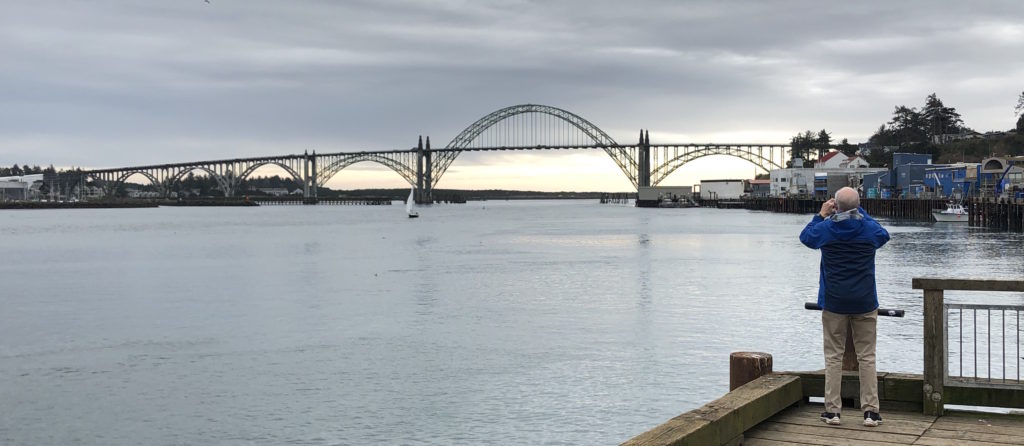
Question 5: Does county government have a role in “quality of life” issues for children, families, singles, and retirees in Lincoln County? If so, how does one local entity do that?
Halbrook: Yes, the county has a role in the quality of life for everyone. By better caring for our employees we can better care for our community. High turnover and vacant positions are not how to ensure that those who turn to the county for assistance get better served. The county has started doing amazing work in recent history with pregnant mothers and those with newborns among other programs, but there are ways to improve the programs we have so people don’t fall through the cracks. How to improve? Ask the end users and the line staff about how programs can be improved. If someone with an advanced degree has trouble navigating services for an adult with autism spectrum disorder how can the person with autism be expected to figure it out? As a result the people I’m thinking of have had to be homeless or have been held in jail because it was the compassionate way to keep them safe over winter. Our system is broken and I have seen where. I can help fix the cracks in the system to better help the citizens while also being a good steward of tax funds
Hall: County government is not an almighty entity that has power over every aspect of the community. Schools, for example, are a contributing factor to the quality of life for children and families. But county government is not in the position of making decisions for the Lincoln County School District — that is up to the elected, five-member school board and superintendent. Even so, it will always be important as a commissioner to enhance the lives of all who live and work in Lincoln County. This includes veterans, seniors, children, and families. Through the years, I’ve either spearheaded or been a key player in the following endeavors — increased veterans benefits and VA coastal clinics; expanding Head Start and early childhood programs, increasing senior services, small business development, growing Lincoln County’s bus system, working with the Confederated Tribes of the Siletz to address local impacts of climate change, support for the Lincoln Land Legacy program to partner with landowners and others to preserve priceless viewsheds and other natural assets, strengthening the county parks system, and offering free spay and neuter services for dogs and cats of qualifying families.
Parker: The county affects life significantly through its policies, goal setting and budget. I think working parents are an excellent demographic to give input on sound fiscal policy, a balanced budget and have emotional ownership in the county, because working families are systemically inserted into the lifestyle. They have school-aged children and have more buy-in since the county assessor directs 26 cents of every property tax dollar to the school district budget. I’ll do my best to recruit more younger volunteers to county committees and non-profits. Supporting community non-profits and young professional groups is one way the county can support a trained, happy and stable workforce. County employees already do a lot for their communities, but adding county branding to it will raise the social profile of the good work already occurring. Retirees have worked hard and also have needs different than the workforce. But the themes are common, like limited budgetary flex month to month. There are existing and successful programs that may need a second look and improvements as we navigate through livability difficulties. Working seniors deserve our respect and support, through various social and economic support programs.
Beasley: Maybe, but it’s not the role of county government to ensure “quality of life,” whatever that means. However, it can make life less bumpy by fixing potholes on hundreds of miles of county roads. It can also make your pursuit of happiness easier by creating the conditions for a prosperous local economy.
Gomez: If you peruse the literature published by the county, you’ll undoubtedly come across numerous references to “quality of life.” This term holds significant weight in governmental discourse because it encapsulates a sentiment deeply ingrained in the fabric of our community. The Oregon coast has long been synonymous with a certain quality of life. Something we’ve cherished perhaps without recognizing its fragility. County government plays a pivotal role in safeguarding and enhancing this cherished quality of life. There are myriad avenues through which our county government can make strides in this endeavor. For instance, the vitality of our natural resources languishes without a robust climate action plan. Additionally, our seniors and veterans face obstacles accessing essential health services, while our infrastructure, including roads, bridges, sewers, and water treatment systems, strains under the weight of overuse. Moreover, our neighbors in unincorporated areas voice concerns about feeling disenfranchised and lacking adequate representation from our current commissioners. Many within these communities express a sense of disconnect, feeling that the very body meant to serve as their local government fails to grasp their unique needs.
How to contact the candidates
Lincoln County voters pamphlet: go here
Claire Hall campaign website: go here
Don Gomez campaign website: go here
Ryan Parker: Email here
Rick Beasley: Email here
Tyrone Halbrook: Email here



Many people may say they would love to live at the Beach, many change their mind after a short time of living here. It isn’t for everyone. I don’t want to see our Community grow to where it’s a big city, I like the quiet calm of this small community and I was happier when people would come in the summer months and we could have vacation houses that were in “walking” distance to the Beach. I purchased my home when there was no limit to short term rentals. I think those of us should have been grandfathered in and I don’t agree with how they have decided on short term rentals at all!! It is unfortunate everywhere that rentals are so incredibly high, but on another note, if you have not had rentals or problems with tenants paying their rent or trying to have someone evicted for not paying, that in itself is very troubling. I think if we purchased in a community where there was vacation rentals for over 30 years, we should leave it that way or grandfather some of it in, instead of forcing people to sell there property. Bayshore has always had vacation rentals, Most all the houses are in walking distance and yet we now have to apply for a license to rent out our homes as a STR when there is hardly enough motels in the area. Part of the problem isn’t just no rentals, its the rate of pay on the coast is much less in a bigger city and people wanting to move here don’t seem to think of some of the drawbacks of moving to the coast.
I’m really getting impatient with people who can afford a second home whining about the STR issue when there are people who work here and can’t find affordable housing. I shed crocodile tears for owners of second homes.